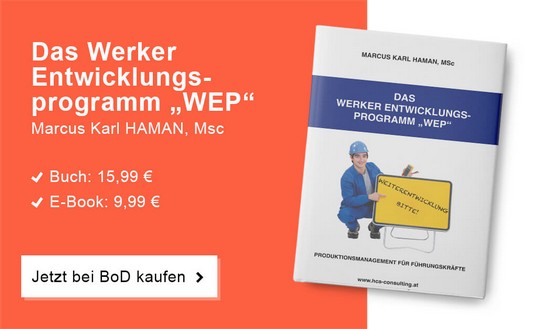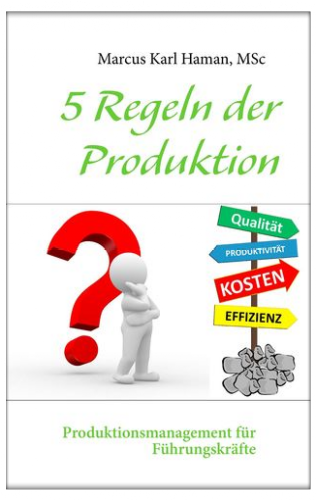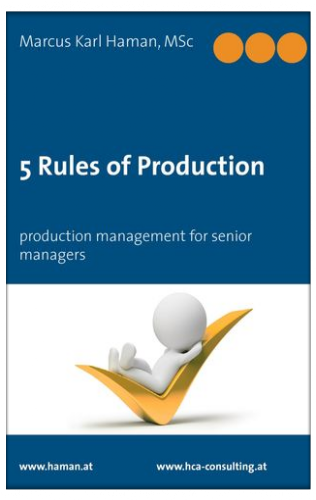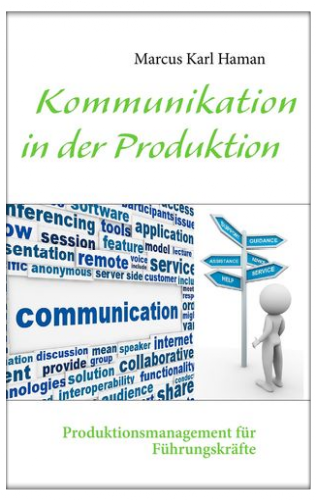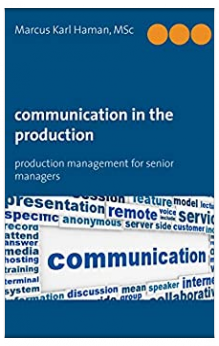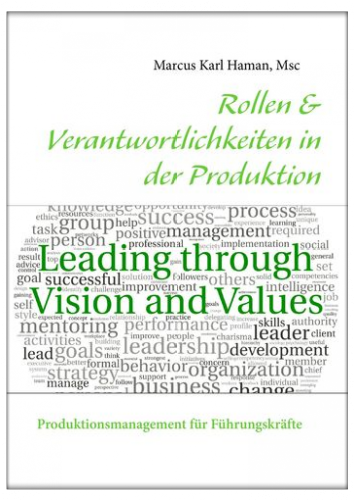Buch
Das Werkerentwicklungsprogramm "WEP"-Buch / Produktionsmanagement für Führungskräfte von Marcus Karl HAMAN, Msc (Autor) erhalten Sie sowohl als Kindle Ausgabe als auch als Taschenbuch.
Ein Unternehmen ist wie ein lebender Organismus anzusehen. Jede Lebensform muss, um zu bestehen, sich weiterentwickeln. Sei es durch Erleben und Sammeln von Erfahrungen oder durch gezielten Wissenstransfer.
Der effektivste Ansatz die Organisation zu verbessern, ist sicherlich die Ausbildung der Menschen, bzw. Mitarbeiter, welche das Kerngeschäft sicherstellen.
Die Schwierigkeit ist es jedoch den Wissenstransfer geregelt und kontrolliert, bzw. strukturiert umzusetzen. Ebenso sind Themen wie Lohngefüge und Funktionszulagen, sowie der Wunsch innerhalb des Unternehmens weiter zu kommen.
Es gibt nicht nur die Management- oder Führungskarriere. Auch die Experten oder Fachexperten Karriere ist ein für den Mitarbeiter attraktiver Karrierepfad, wenn diese auch entsprechend kommuniziert und gelebt wird.
Das Werker Entwicklungsprogramm, kurz WEP, gibt einen Weg vor, standardisiertes Wissensmanagement und Weiterentwicklung in einem Unternehmen erfolgreich umzusetzen und gewinnbringend für die Organisation zu nutzen.
Erhältlich unter:
Weitere Bücher und Empfehlungen:
5 Regeln der Produktion: Produktionsmanagement für Führungskräfte
Kultur und im speziellen die Unternehmenskultur wird immer von OBEN gelebt und vorgegeben. Diese prägt die gesamte Organisation.
Viele Produktionsunternehmen scheitern an der vorgelebten Kultur ihrer Manager.
Führungskräfte verbringen mehr Zeit in Besprechungsräumen als am Shopfloor.
Die Einbeziehung aller Mitarbeiter ist ein wesentlicher Aspekt am steinigen Weg zum nachhaltigen und kontinuierlichen Erfolg.
Mitarbeiter benötigen Führung, Probleme eine strukturierte und konsequente in Prozessen definierte Vorgehensweise.
Die 5 Regeln der Produktion beschreibt in groben Zügen, kurz und prägnant worauf es ankommt um effizient und effektiv im Kerngeschäft zu agieren.
So kurz das Buch auch verfasst ist, es steckt eine Menge Arbeit dahinter, diese Empfehlungen umzusetzen.
5 Rules of Production: production management for senior managers (English Edition)
Production is a lively cultural process with its own rules and structures. In order to understand production correctly, it must be learnt and experienced. Not in the lecture hall – but on the shopfloor!
Like every other discipline, the production too is a field of enterprise with its own rules and structures. Comparable with a kitchen. It gives recipes and ingredients, pots and other utensils, which the cook can use to create a symposium of a treat. A top cook learns the hard craft over several years; despite that the taste is not of the same quality for every cook.
An example for this: A champion cook writes a cookery book, wherein he lists and describes the ingredients, mentions exact quantities and discloses his very precise recipe, so that just about everything is explained and described. Do you really believe that it tastes as good if it is cooked by someone else? Perhaps, however, it will always taste differently and never the same.
To the question, as to why this is so, there can only be one explanation:
„Not everyone can cook!“
And that is how it is also with the production. Production must be understood.
Whosoever thinks that he has learnt production in the university makes a mistake. Production is learnt on the shopfloor, starting from scratch. On the production line and not in the lecture hall.
And one thing is certain: Production is more complex than one thinks.
Kommunikation in der Produktion: Produktionsmanagement für Führungskräfte
Die Probleme sind nicht im Besprechungszimmer, vielmehr am Shopfloor zu finden.
Wenn Führungskräfte mehr Zeit in Besprechungen als am Shopfloor verbringen, können diese ihre Führungsverantwortung und Aufgaben nicht nachkommen, bzw. die gesteckten Ziele nicht erreichen.
Kommunikation in der Produktion behandelt die Besprechungsthematik im produktivem Umfeld und stellt, in einer zusammengefassten Form, eine mögliche Besprechungslandschaft dar.
Aus der Praxis, für die Praxis.
Communication in the Production: production management for senior managers
Communication in the production and especially on the shop-floor is more important than many a manager would think. To hold discussions and reviews over all possible subjects seems to have become a kind of sports discipline in many organizations. The false belief of many senior managers is to think that the more discussions a manager attends, the more important and esteemed he is. Otherwise no one would think of inviting him.
And already the manager is sitting in a conference room and discussing with other participants. Naturally with coffee and if possible also with biscuits and cakes. A fantastic picture for every employee on the shopfloor, or?
A manager is only then a manager, when he car-ries out his management responsibility or can carry it out.
And this is only limitedly possible in a conference room, since the problems are to be found on the shopfloor and not in the conference room.
Here it must also be said that not all the discus-sions in the conference rooms are unnecessary, or are a wastage. There indeed are discussions, which should or must take place in closed or quiet areas.
But how many of the discussions really take place due to these reasons? And how many discussions take place with participants, who ask themselves only one question over the entire meeting: „What am I really doing here?“
The inviting party should ask himself the following questions, as for instance:
- How structured is the discussion?
- How prepared is the discussion?
- Are the right participants invited?
- Which objective, which significant points does the discussion have?
- How long should the discussion last?
- Which rules are there in the discussion, in case it does not run so smoothly?
- Where should the discussion take place?
Rollen & Verantwortlichkeiten in der Produktion: Produktionsmanagement für Führungskräfte
Die klare Rollen- & Verantwortlichkeitsregelung in einem produktivem Unternehmen ist essentiell für den Erfolg und der nachhaltigen, kontinuierlichen Weiterentwicklung.
Potentiale in Mitarbeitern zu erkennen ist nichts, was im „Supermarkt für Führungskräfte“ gekauft werden kann.
Und sind es nicht meistens die simplen „Dinge“, welche funktionieren und erfolgreich umzusetzen sind?
Vom Leitbild über die Strategien bis zum Aktionsplan an der Linie müssen Ziele transparent vereinbart, kontrolliert und eingefordert werden. Einfache und klare Strukturen in einem transparentem und teamorientiertem Umfeld motivieren Mitarbeiter Ziele zu erreichen, bzw. zu übertreffen.
Ebenso ist es essentiell, dass alle Rollen innerhalb der Organisation klar definiert sind. Noch mehr, dass diese Verantwortlichkeiten auch konsequent eingefordert werden.
Und wie auch in anderen Themen kommt es auch hier wieder einmal auf das wichtigste Gut in einer Organisation an – dem Menschen.

